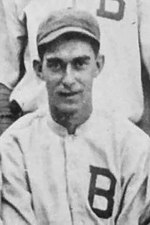Larry Gilbert (baseball), Date of Birth, Place of Birth, Date of Death
TweetLarry Gilbert (baseball)
American baseball player
 Date of Birth: 03-Dec-1891
Date of Birth: 03-Dec-1891
 Place of Birth: New Orleans, Louisiana, United States
Place of Birth: New Orleans, Louisiana, United States
Date of Death: 17-Feb-1965
Profession: baseball player
Nationality: United States
Zodiac Sign: Sagittarius 
About Larry Gilbert (baseball)
- Lawrence William Gilbert (December 3, 1891 – February 17, 1965) was an American right fielder in Major League Baseball and a longtime manager in minor league baseball.
- A native of New Orleans, Louisiana, who broke into baseball as a left-handed pitcher, Gilbert first became famous as a member of the 1914 "Miracle" Boston Braves. But his Major League career lasted only two seasons (the Braves' breakthrough 1914 campaign and 1915).
- A left-handed batter, he batted .230 with five homers, 29 runs batted in, ten doubles and seven stolen bases.
- In 1914, Gilbert was a member of the Braves team that went from last place to first in two months, becoming the first team to win a pennant after being in last place on the Fourth of July.
- The team then went on to defeat Connie Mack's heavily favored Philadelphia Athletics in the 1914 World Series.
- In the series, he drew an intentional walk in his only appearance. Gilbert became more famous as a minor league manager in the Southern Association, where he led teams for 25 seasons, including the New Orleans Pelicans from 1923–31 and 1933–38 and the Nashville Vols from 1939–48.
- He took 1932 off from his dugout duties to serve as president of the Pelicans, then was a part-owner of the Vols from 1939 through 1955.
- His managing career was bracketed by pennants.
- His New Orleans club posted 89 wins and a .610 winning percentage in 1923, and his final club, in Nashville, won 95 games but lost the 1948 playoff championship. Gilbert won eight Southern Association championships during his quarter-century in the league, including six consecutive titles (1939–44) with the Vols.
- His clubs twice won 101 games (1926 with New Orleans and 1940 with Nashville).
- Gilbert's career record as a minor league skipper was 2,128 wins and 1,627 defeats (.567). He died in New Orleans of undisclosed causes at age 73.
- He was the father of Charlie Gilbert, a National League outfielder from 1940–43 and in 1946–47, and Tookie Gilbert, a minor league slugger with the Vols who had two trials with the New York Giants in the early 1950s.
Read more at Wikipedia

